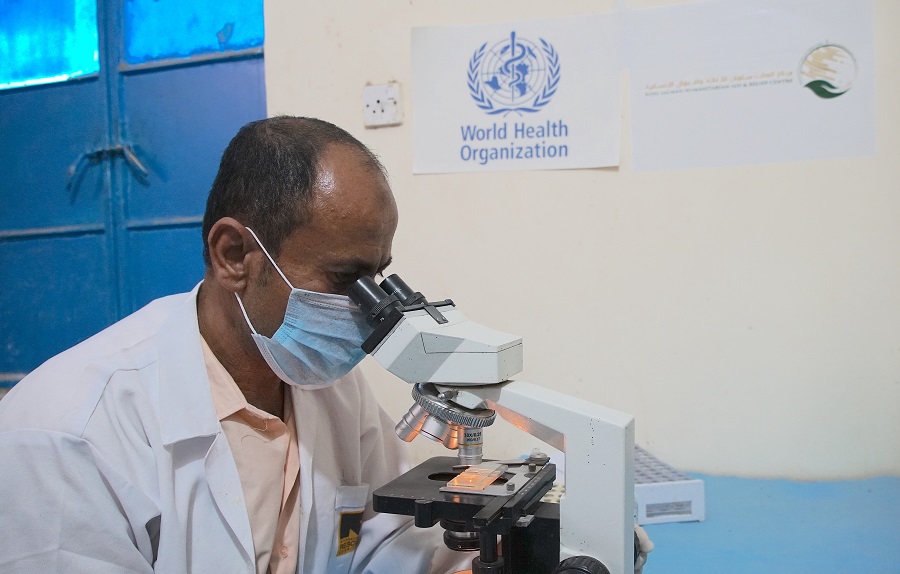
31 May 2022 – The World Health Organization (WHO) is partnering with the King Salman Humanitarian Aid and Relief Centre (KSrelief) to sustain the COVID-19 response and essential services at targeted health care facilities, combined with community-based interventions.
These focused and extensive health interventions will be carried out by WHO in Yemen over the next 10 months, with US$ 10.86 million in total project funding from KSrelief. Interventions are being guided by vulnerability assessessments of exacerbating factors such as morbidity, environmental hazards and social determinants of health. The interventions will follow 2 reinforcing tracks of action:
Providing equipment, medicines and materials worth US$ 6.23 million to limit transmission of the COVID-19 response in Yemen and help health authorities to reduce the number of cases referred to health facilities; and
Providing equipment and medicines worth US$ 2.17 million to sustain and improve the quality of essential services of health facilities and laboratories in priority districts of Yemen.
Project interventions focus on sustaining the COVID-19 response in Yemen to limit transmission of the virus and help health authorities reduce cases referred to health facilities. This grant will build on existing actions and services currently being undertaken to improve the COVID-19 response and expand programme delivery. These interventions should directly or indirectly benefit some 4.5 million of 7.3 million people who are targeted by Yemen's Humanitarian Response Plan.
Project interventions to sustain essential health services will focus partially on strengthening epidemiological and laboratory surveillance to reduce the prevalence of outbreaks. The needed equipment, supplies and medicines will also be procured for essential health services spanning treatment of noncommunicable diseases, general care, child health, reproductive and maternal health, dialysis, and other services. These interventions should directly or indirectly benefit some 2.5 million people. Interventions will aim to improve prevention, response and referral capacities of primary and secondary health care facilities that are overwhelmed with patients requiring critical care. Community-based interventions will also be expanded to reduce these pressures on health care facilities across Yemen.
All project activities will be implemented in close coordination with the Ministry of Public Health in Sana’a and Aden. WHO will ensure their sustainability through coordination mechanisms and capacity-building with national public and civil society organizations. WHO Yemen will work closely with all stakeholders and partners to design specific interventions and monitor pre-determined indicators.
Senior staff and management at the WHO country office and the regional and headquarters level will also work with senior officials of the Ministry to ensure that resources are utilized appropriately and that lessons learned are shared with stakeholders and partners.
“The provision of essential services at health care facilities across Yemen remains very challenging, as the majority of Yemen’s 30.7 million people are in need of of these services,” said Dr Adham Dr Adham Rashad Ismail Abdel-Moneim, WHO Representative to Yemen. “These interventions to be carried out by WHO, in partnership with KSrelief, over the next 10 months will be of critical benefit to millions of people across Yemen, even as only about half the country’s health facilities are fully functioning at present.”


